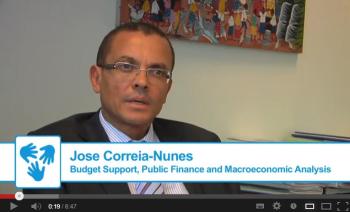A learning event was organised in Banjul in February 2020 to accompany The Gambia in the design and implementation of its public policy. The trainers are sharing how they developed this course and the benefits of choosing delivery methods that are helping participants to apply their own experience and knowledge.
Since its peaceful democratic elections in 2017, The Gambia has introduced key economic reforms. The constructive approach of the new local government and the emerging economic developments have encouraged the European Union to extend its support by adopting a series of State and Resilience Building Contracts (SRBCs).
The training, organised in Banjul for national counterparts early this year, aimed at achieving a more strategic, structured, pro-active and documented policy dialogue. This event was set notably, but not solely, in the framework of the third State and Resilience Building Contracts (SRBC3) and upcoming budget support operations in The Gambia.
- Preparation with the Ministry of Finance. Discussions were held both with the EU Delegation and the Ministry of Finance of The Gambia to determine the needs for the training and to discuss possible approaches. Previous training experience has shown that training and retention of knowledge works better when participants co-operate towards pre-agreed objectives. In this case, policy dialogue and disbursement files were to be the center of attention. It was agreed to focus the workshop on the preparation of an outline for a disbursement report, so that participants could both become familiar with the importance of policy dialogue in the context of budget support, and leave the training with useful tools for future budget support reporting
- Interactive delivery methods. The training was both a learning event and a workshop. The learning event enabled a more in-depth familiarisation with budget support principles, with the requirements of the EU in terms of the continued satisfaction according to the eligibility criteria, and with the disbursement process. The workshop enabled the participants to gradually build a monitoring and reporting framework for the EU budget support operations, whilst understanding the crucial role of policy dialogue both from the EU’s and their own perspectives. Hands-on exercises (with cards, boards, walls etc.) were used, as well as group work and discussions.
- Concrete output: the monitoring, policy dialogue and reporting framework outline and road map. The monitoring, policy dialogue and reporting framework, based on the existing processes used by the Government of The Gambia, describes the expected content of a disbursement report for EU budget support. It should frame questions to update the EU on the policies it is supporting, and on the results of the implementation of these policies (1). The report outline prepared by the participants in Banjul will allow them to discuss and report back to the EU on the continued relevance and credibility of the policies the EU is supporting.;
- Local coordination. The presence of a local-based coordinator in Bhutan allows a deeper understanding of the local reality and facilitates a regular flow of communication.
- Flexibility and adaptation. Being able to innovate and support parliaments at short notice is key. This is particularly crucial during the COVID-19 pandemic.
Budget support in fragile states and policy dialogue
The SRBCs are used in fragile contexts. “In Africa, they are mostly implemented in the west and centre of the continent. Since 2016, these instruments have been designed for complex and volatile environments and account for about 10% of the number of budget support contracts and 16% of all budget support commitments (2).”
Eligibility criteria
Eligibility criteria for SRBCs are the same as those of the two other types of budget support provided by the EU (Sustainable Development Goals Contracts (SDG-C) and Sector Reform Performance Contracts (SRPC)). However, their focus will be adapted on a case-by-case basis to the weaknesses inherent to situations of fragility and notably to capacity constraints.
Eligibility assessments for SRBCs are based on political engagement and institutional reforms and at the outset focus less on government’s past achievements. Policy dialogue, therefore, is very important to reduce the challenges or risks that have been identified by the assessment and to help government focus on key actions to restore core state functions, maintain public services and foster resilience.
In the case of The Gambia, the SRBCs are closely linked with the Government’s commitment to fundamental core values and issues, such as constitutional review, climate, and gender, which are crucial for the country’s sustainable development. The Gambia budget support programme includes a series of three consecutive SRBCs for a total of EUR 140 million.
Towards aid effectiveness
This training was a unique opportunity for national counterparts to learn hands-on tools and receive guidance on a complex issue. “It successfully addressed aid effectiveness, ownership, and shared useful tools for effective dialogue,” said Josselin Amalfi, former EU Programme Manager at the Delegation to The Gambia.
In the following video, Karolyn Thunnissen, budget support trainer, highlights the key lessons learnt of the workshop held in The Gambia.
In the following video, Jerome Dendura, budget support trainer, explains the training delivery methods.
Some background
Since its peaceful democratic elections in 2017, The Gambia has introduced key economic reforms. The constructive approach of the new local government and the emerging economic developments have encouraged the European Union to extend its support by adopting a series of State and Resilience Building Contracts (SRBCs).
At a high-level conference held in Brussels in May 2018, development partners to The Gambia including the EU, pledged over EUR 1.45 billion to support the country’s transition to democracy and economic growth. Earlier, in 2017, a SRBC was approved, and the first EUR 25 million was allocated at the end of that year to contribute to the country’s stability.
(1) The questions to be addressed include: Have policy directions changed? If yes, why and in which areas? What are the new policy directions? Is policy implementation on track? Is it delivering the planned/expected outcomes? If not, why not? What corrective measures have been taken?
(2) https://ec.europa.eu/international-partnerships/system/files/budget-support-trends-and-results_en.pdf - page 59.
Credit: Videos © Capacity4dev| Photo by © AbsolutVision on Unsplash





Log in with your EU Login account to post or comment on the platform.